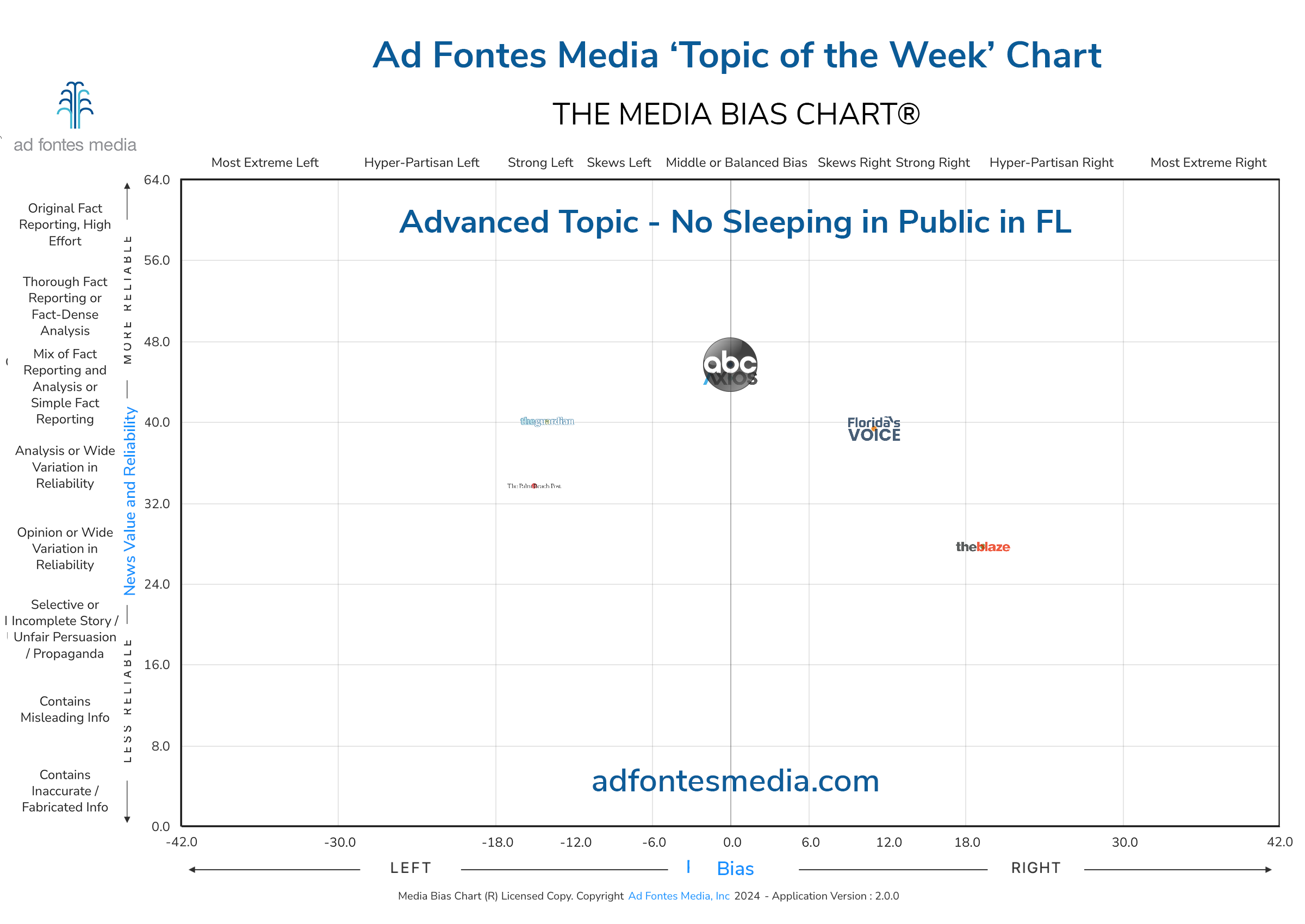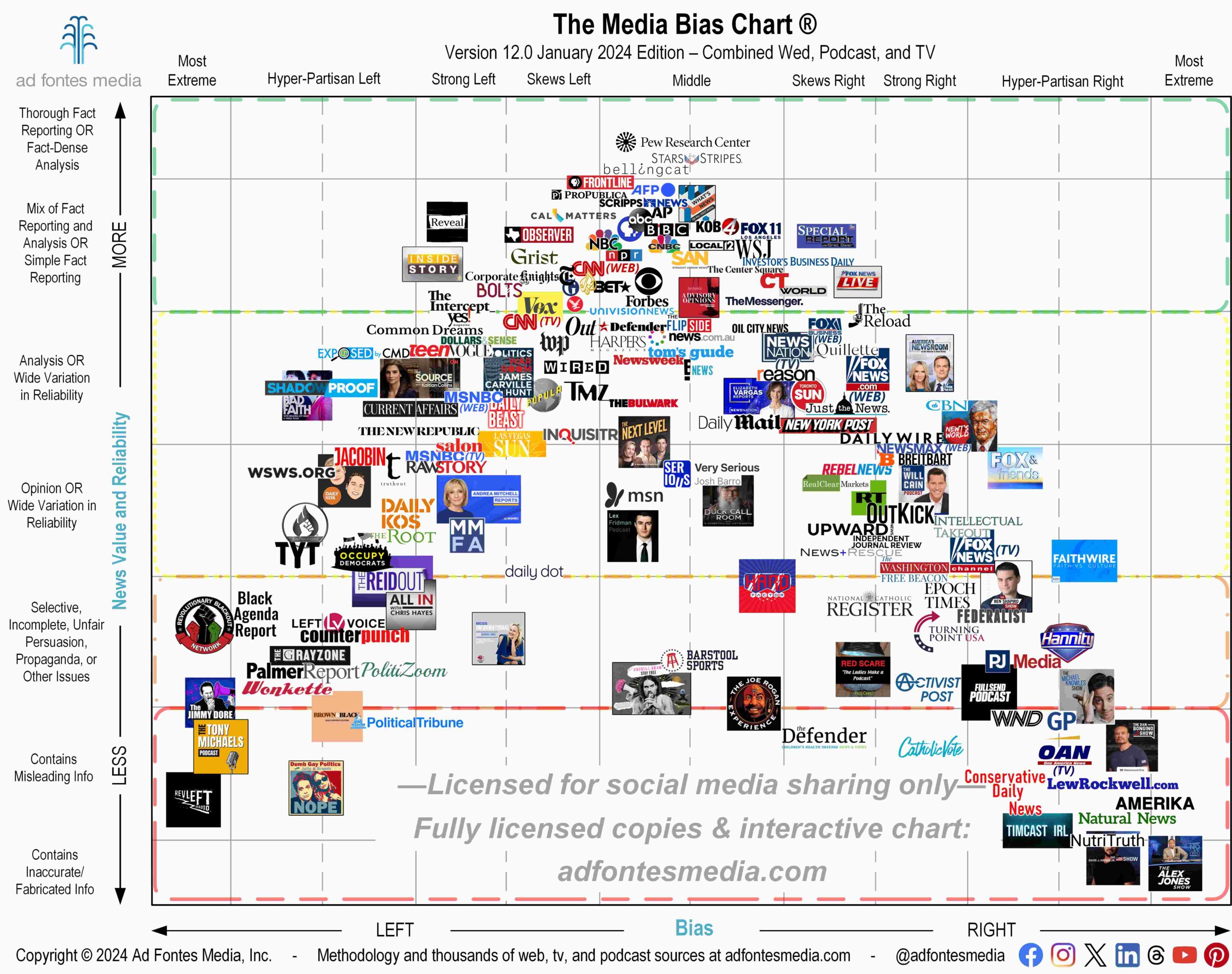Menu

Florida Law Bans Homeless from Sleeping in Public
The Media Bias Chart takes a look at articles covering HB1365, which prohibits cities and counties from allowing people to sleep in public places in Florida and allows local governments to create homeless camps if shelters reach capacity
Author:
Sara Webb
Date:
03/29/2024
Florida’s homeless will be banned from sleeping on sidewalks and in parks and other public spaces under a law signed on March 20 by Gov. Ron DeSantis. It promises the homeless greater access to services for issues such as substance abuse and mental health problems. DeSantis says the law will improve public safety, but it doesn’t include housing solutions that experts say are critical to addressing homelessness. Our analysts examined coverage of HB1365 in our Topic of the Week.
Each week, Ad Fontes Media chooses a widely covered trending news topic to share insight into how our analysts rank news coverage for the Media Bias Chart®. To do this, we select six articles reporting on the same story from different outlets to show how each treated the subject.
Once we choose a set of articles, pods of analysts with diverse political perspectives (one right leaning, one center, and one left leaning) read each article and use Ad Fontes Media’s content analysis methodology to determine its bias and reliability. These ratings inform the articles’ placement on that week’s special Media Bias Chart.
Our analyst team took a closer look at several articles about the Florida law from various media outlets last week: “Florida is seeing an increase in homelessness. A Republican bill could make it worse” from The Guardian, “Liberals are melting down after Ron DeSantis signs bills forbidding homeless people camping in public spaces: ‘This is cruel’” from The Blaze, “Homeless in this state to be banned from sleeping in public under governor-backed law” from ABC News, “Florida’s homelessness crisis is swelling. A new bill will worsen, not fix it.” from The Palm Beach Post, “Ron DeSantis signs anti-homeless encampment law” from Florida’s Voice, and “DeSantis signs bill banning unhoused people from sleeping in public spaces” from Axios. While the bias and reliability scores for each of these articles can be found on our Topic of the Week page, we will be looking closer at reactions from The Blaze and The Palm Beach Post.
The Blaze is a news and entertainment company founded in 2010 by conservative political commentator Glenn Beck. It describes its coverage as “pro-America and pro-free speech.” The website is part of Blaze Media, which is based in Irving, Texas, and in Washington, D.C. Our analysts have given The Blaze an overall bias score of 13.72 (strong right) and overall reliability score of 33.41 (analysis or wide variation in reliability). This week’s article was rated at 19.33 for bias (hyper-partisan right) and 27.67 for reliability (opinion or wide variation in reliability).
This article offers an abbreviated view of the bill: “The bill would ban homeless people from sleeping or camping on public streets, sidewalks, or in parks beginning Oct. 1.” But mostly it pokes fun at the reactions from people on the left, who were characterized as both “outraged” and “melting down” over the bill’s passing.
The one subtopic in this article? “Sobriety is ‘not realistic’,” followed by a selection of interview snippets and social media posts, though the article offers no context as to the part that sobriety plays in the bill. The ABC News article from this week did, stating that Florida’s “Department of Children and Families would oversee local governments that set up designated areas for the homeless to camp for up to a year under the new law, which takes effect Oct. 1. Anyone using those encampments would be prohibited from using alcohol or illegal drugs, with sanitation and security to be provided.”
While the reactions included in the article all speak out against the bill, this article is still quite right-leaning. The out-of-context quote about sobriety, the headline about liberals “melting down,” and the very heated reactions from the internet sketch a picture that makes it seem like anyone opposing the measure is, in fact, in favor of letting folks sleep anywhere, disrupting businesses and squatting wherever they please.
The Palm Beach Post is a daily newspaper serving Palm Beach County in South Florida and parts of the Treasure Coast and was first published in 1916. It has been rated at -3.75 for bias (middle or balanced) and 41.15 for reliability (mix of fact reporting and analysis). This week’s article is marked as an opinion piece, and was rated at -15 for bias (strong left) and 33.67 for reliability (analysis or wide variation in reliability).
This editorial quotes Diana Stanley, the CEO of The Lord’s Place, who says that the law seems like a solution to put the homeless out of view: “if you don’t see them, then you don’t have to help them.”
The editorial states that Palm Beach County nonprofits and volunteers have been addressing the problem of homelessness, “So it’s not clear why anyone thinks what’s needed is a heavy-handed state law that provides no help — just an unfunded and unnecessary mandate that localities must prohibit ‘public camping and public sleeping.’ If they wish to designate a location for the homeless to camp, they need state permission and inspections by the Florida Department of Children and Families.”
The Post leaves this advice for DeSantis: “… if the Governor really wants to help, instead of signing it, he should redouble efforts to fund housing, mental health care and addiction treatment.”
This opinion piece comes across as sad that the Florida legislature and DeSantis (“a tough-guy Governor who says he’s going to keep Florida from turning into another San Francisco”) decided to legislate the homeless problem instead of working with local groups to try and solve it. It demonstrates a left-leaning bias for its view on DeSantis and because it advocates for measures to ameliorate homelessness by means other than pushing them into camps.
For a counterpoint to these articles, take a look at the Starter Topic of the Week from the same time frame, which explored how California voted to address homelessness: by creating more beds for behavioral health treatment and for drug treatment, and by earmarking funds specifically for veterans. It will be interesting to follow each approach and find out which ultimately improves the problem of homelessness.
These are just a few examples of the thousands of articles our analysts have rated for reliability and bias. If you want a look at the larger media landscape or are curious to see how our analysts have rated your favorite sources, head on over to our website and check out the resources we have available. And don’t forget to come back for another examination of our Topic of the Week.
If you want to stay informed on all of our amazing work, join our free mailing list!


